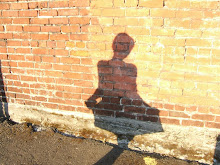It is difficult for me to respond or enter into a conversation with the Westboro Baptist Church because—in perusing their website—they provide no philosophical argument of fundamental truth. They are stating their ideology by raising statements and images devaluing and condemning certain ways of life: homosexuality, priesthood, etc. In my eyes, they are stating the same idea over and over, forcing their passionate hatred upon others without explaining or arguing for their position in nuanced or dynamic ways. To think of having a conversation with someone from their community seems like it would be stepping into futility—a one-sided conversation ensuing, where they repeat their unsubstantiated claims and you point out ideas and possibilities for exploration.
So, how to define their worldview? I read an article written by Louis Theroux for The Gaurdian in an attempt to further understand the community. Theroux lived with the family for a short while and seemed to make little headway in terms of a full explanation of their beliefs. However, the article incited a short-lived relativism in me: If one looks at the personalities of the family, it seems from Theroux’s perspective that these are sane humans, perhaps even with a family unit to be envied. However, when it comes to the lens with which they view the world—America, people, society, and the actual application and direction of these strong emotions and personalities—herein lies the difference: A group of people so at odds with other humans, so at odds with the current functioning of humanity, it seems to me so fearful of opening their minds to anything outside of their narrow understanding of things through the bible, that they impose and denounce everything around them without first examining the opposing qualities within that certain subject or thing. They don’t pause for a moment to question their assumptions. Once they make an idea they stick to it, not surprisingly, religiously. In some sense, they must gain a sense of comfort from their increased denunciation of certain groups. It sounds like from their beginnings in 1955, their picketing and targets have become more and more radical, finally protesting the funerals of deceased soldiers. Perhaps the family realized the easy attention gained when protesting things or beliefs commonly held to be true. To maintain this shock factor, this level of response from other humans [even if it is a negative response] they inevitably had to become more drastic in their efforts. Just as some people return to potentially harmful relationships for the sense of recognition in another’s eyes, this family fails to realize the negativity of their message and the possibility of gaining recognition in a way that requires less hate.
The family seems not to believe in respect for other human beings. They are unwilling to believe that humans are capable of doing good. If people naturally have feelings of inadequacy, perhaps their idea of “Unconditional Election” gives them an easy way out: by ascribing all-importance to a being not of this world—and thus subject to one’s own definition, beliefs and interpretation—they have taken that pressure to be acceptable in the eye of a human beholder off of themselves and said ‘we are the chosen ones, we are accepted no matter what anyone else says or thinks or does.’ They escape the fear and uncertainty of death in their idea of “Irresistible Grace,” where they will be saved no matter what. Nothing that they can do is wrong because they are God’s few chosen ones and thus their actions are basically God’s actions.

No comments:
Post a Comment